The Theme of History and Historical Representation in Waterland
VerifiedAdded on 2023/06/11
|10
|3848
|84
Essay
AI Summary
This essay delves into the theme of history and its representation in Graham Swift's novel "Waterland." It explores how historical events and oral histories shape the lives of the characters, particularly Tom Crick, his brother Dick, and Tom's wife, Mary. The essay discusses how the past influences the present and future, using examples such as Mary's infertility and its impact on their marriage. It examines Tom's engagement with history, both as a subject of study and as a means of escaping his personal traumas. The essay further analyzes the novel's portrayal of history as a complex and sometimes unreliable narrative, questioning its relevance and influence on individuals' lives, and highlighting the characters' varying relationships with the past. Desklib offers a platform to explore more such solved assignments.
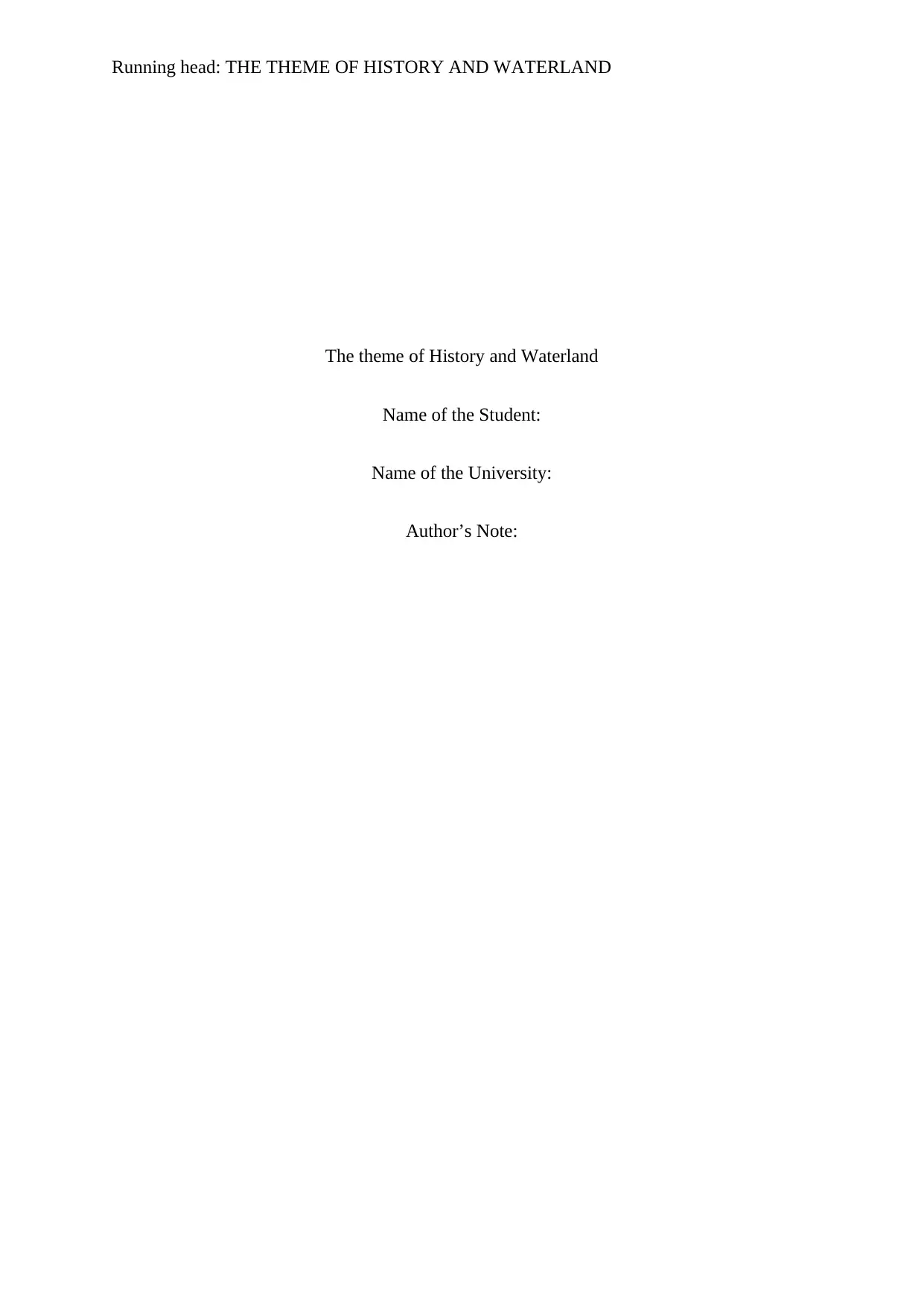
Running head: THE THEME OF HISTORY AND WATERLAND
The theme of History and Waterland
Name of the Student:
Name of the University:
Author’s Note:
The theme of History and Waterland
Name of the Student:
Name of the University:
Author’s Note:
Paraphrase This Document
Need a fresh take? Get an instant paraphrase of this document with our AI Paraphraser
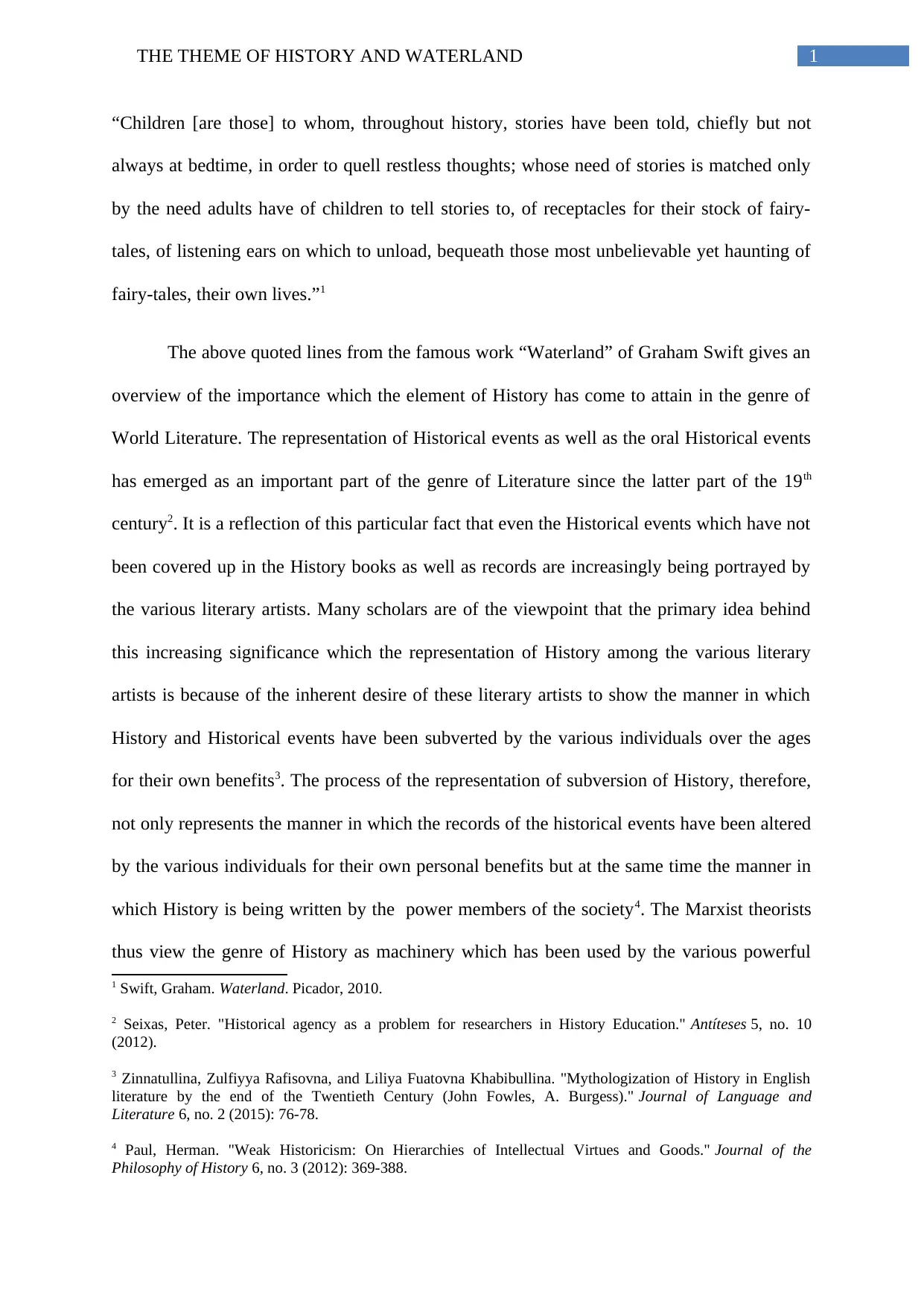
1THE THEME OF HISTORY AND WATERLAND
“Children [are those] to whom, throughout history, stories have been told, chiefly but not
always at bedtime, in order to quell restless thoughts; whose need of stories is matched only
by the need adults have of children to tell stories to, of receptacles for their stock of fairy-
tales, of listening ears on which to unload, bequeath those most unbelievable yet haunting of
fairy-tales, their own lives.”1
The above quoted lines from the famous work “Waterland” of Graham Swift gives an
overview of the importance which the element of History has come to attain in the genre of
World Literature. The representation of Historical events as well as the oral Historical events
has emerged as an important part of the genre of Literature since the latter part of the 19th
century2. It is a reflection of this particular fact that even the Historical events which have not
been covered up in the History books as well as records are increasingly being portrayed by
the various literary artists. Many scholars are of the viewpoint that the primary idea behind
this increasing significance which the representation of History among the various literary
artists is because of the inherent desire of these literary artists to show the manner in which
History and Historical events have been subverted by the various individuals over the ages
for their own benefits3. The process of the representation of subversion of History, therefore,
not only represents the manner in which the records of the historical events have been altered
by the various individuals for their own personal benefits but at the same time the manner in
which History is being written by the power members of the society4. The Marxist theorists
thus view the genre of History as machinery which has been used by the various powerful
1 Swift, Graham. Waterland. Picador, 2010.
2 Seixas, Peter. "Historical agency as a problem for researchers in History Education." Antíteses 5, no. 10
(2012).
3 Zinnatullina, Zulfiyya Rafisovna, and Liliya Fuatovna Khabibullina. "Mythologization of History in English
literature by the end of the Twentieth Century (John Fowles, A. Burgess)." Journal of Language and
Literature 6, no. 2 (2015): 76-78.
4 Paul, Herman. "Weak Historicism: On Hierarchies of Intellectual Virtues and Goods." Journal of the
Philosophy of History 6, no. 3 (2012): 369-388.
“Children [are those] to whom, throughout history, stories have been told, chiefly but not
always at bedtime, in order to quell restless thoughts; whose need of stories is matched only
by the need adults have of children to tell stories to, of receptacles for their stock of fairy-
tales, of listening ears on which to unload, bequeath those most unbelievable yet haunting of
fairy-tales, their own lives.”1
The above quoted lines from the famous work “Waterland” of Graham Swift gives an
overview of the importance which the element of History has come to attain in the genre of
World Literature. The representation of Historical events as well as the oral Historical events
has emerged as an important part of the genre of Literature since the latter part of the 19th
century2. It is a reflection of this particular fact that even the Historical events which have not
been covered up in the History books as well as records are increasingly being portrayed by
the various literary artists. Many scholars are of the viewpoint that the primary idea behind
this increasing significance which the representation of History among the various literary
artists is because of the inherent desire of these literary artists to show the manner in which
History and Historical events have been subverted by the various individuals over the ages
for their own benefits3. The process of the representation of subversion of History, therefore,
not only represents the manner in which the records of the historical events have been altered
by the various individuals for their own personal benefits but at the same time the manner in
which History is being written by the power members of the society4. The Marxist theorists
thus view the genre of History as machinery which has been used by the various powerful
1 Swift, Graham. Waterland. Picador, 2010.
2 Seixas, Peter. "Historical agency as a problem for researchers in History Education." Antíteses 5, no. 10
(2012).
3 Zinnatullina, Zulfiyya Rafisovna, and Liliya Fuatovna Khabibullina. "Mythologization of History in English
literature by the end of the Twentieth Century (John Fowles, A. Burgess)." Journal of Language and
Literature 6, no. 2 (2015): 76-78.
4 Paul, Herman. "Weak Historicism: On Hierarchies of Intellectual Virtues and Goods." Journal of the
Philosophy of History 6, no. 3 (2012): 369-388.
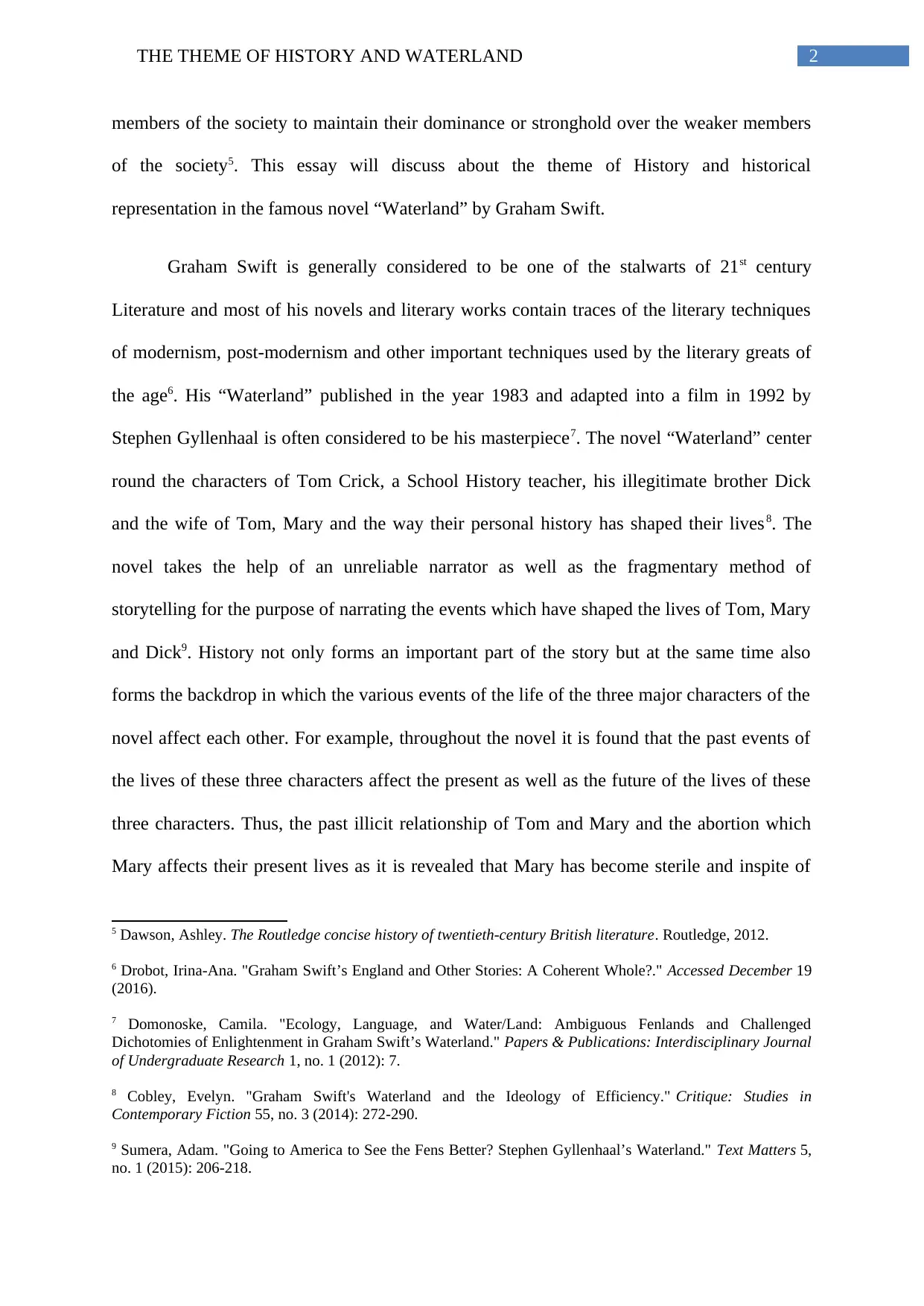
2THE THEME OF HISTORY AND WATERLAND
members of the society to maintain their dominance or stronghold over the weaker members
of the society5. This essay will discuss about the theme of History and historical
representation in the famous novel “Waterland” by Graham Swift.
Graham Swift is generally considered to be one of the stalwarts of 21st century
Literature and most of his novels and literary works contain traces of the literary techniques
of modernism, post-modernism and other important techniques used by the literary greats of
the age6. His “Waterland” published in the year 1983 and adapted into a film in 1992 by
Stephen Gyllenhaal is often considered to be his masterpiece7. The novel “Waterland” center
round the characters of Tom Crick, a School History teacher, his illegitimate brother Dick
and the wife of Tom, Mary and the way their personal history has shaped their lives8. The
novel takes the help of an unreliable narrator as well as the fragmentary method of
storytelling for the purpose of narrating the events which have shaped the lives of Tom, Mary
and Dick9. History not only forms an important part of the story but at the same time also
forms the backdrop in which the various events of the life of the three major characters of the
novel affect each other. For example, throughout the novel it is found that the past events of
the lives of these three characters affect the present as well as the future of the lives of these
three characters. Thus, the past illicit relationship of Tom and Mary and the abortion which
Mary affects their present lives as it is revealed that Mary has become sterile and inspite of
5 Dawson, Ashley. The Routledge concise history of twentieth-century British literature. Routledge, 2012.
6 Drobot, Irina-Ana. "Graham Swift’s England and Other Stories: A Coherent Whole?." Accessed December 19
(2016).
7 Domonoske, Camila. "Ecology, Language, and Water/Land: Ambiguous Fenlands and Challenged
Dichotomies of Enlightenment in Graham Swift’s Waterland." Papers & Publications: Interdisciplinary Journal
of Undergraduate Research 1, no. 1 (2012): 7.
8 Cobley, Evelyn. "Graham Swift's Waterland and the Ideology of Efficiency." Critique: Studies in
Contemporary Fiction 55, no. 3 (2014): 272-290.
9 Sumera, Adam. "Going to America to See the Fens Better? Stephen Gyllenhaal’s Waterland." Text Matters 5,
no. 1 (2015): 206-218.
members of the society to maintain their dominance or stronghold over the weaker members
of the society5. This essay will discuss about the theme of History and historical
representation in the famous novel “Waterland” by Graham Swift.
Graham Swift is generally considered to be one of the stalwarts of 21st century
Literature and most of his novels and literary works contain traces of the literary techniques
of modernism, post-modernism and other important techniques used by the literary greats of
the age6. His “Waterland” published in the year 1983 and adapted into a film in 1992 by
Stephen Gyllenhaal is often considered to be his masterpiece7. The novel “Waterland” center
round the characters of Tom Crick, a School History teacher, his illegitimate brother Dick
and the wife of Tom, Mary and the way their personal history has shaped their lives8. The
novel takes the help of an unreliable narrator as well as the fragmentary method of
storytelling for the purpose of narrating the events which have shaped the lives of Tom, Mary
and Dick9. History not only forms an important part of the story but at the same time also
forms the backdrop in which the various events of the life of the three major characters of the
novel affect each other. For example, throughout the novel it is found that the past events of
the lives of these three characters affect the present as well as the future of the lives of these
three characters. Thus, the past illicit relationship of Tom and Mary and the abortion which
Mary affects their present lives as it is revealed that Mary has become sterile and inspite of
5 Dawson, Ashley. The Routledge concise history of twentieth-century British literature. Routledge, 2012.
6 Drobot, Irina-Ana. "Graham Swift’s England and Other Stories: A Coherent Whole?." Accessed December 19
(2016).
7 Domonoske, Camila. "Ecology, Language, and Water/Land: Ambiguous Fenlands and Challenged
Dichotomies of Enlightenment in Graham Swift’s Waterland." Papers & Publications: Interdisciplinary Journal
of Undergraduate Research 1, no. 1 (2012): 7.
8 Cobley, Evelyn. "Graham Swift's Waterland and the Ideology of Efficiency." Critique: Studies in
Contemporary Fiction 55, no. 3 (2014): 272-290.
9 Sumera, Adam. "Going to America to See the Fens Better? Stephen Gyllenhaal’s Waterland." Text Matters 5,
no. 1 (2015): 206-218.
⊘ This is a preview!⊘
Do you want full access?
Subscribe today to unlock all pages.

Trusted by 1+ million students worldwide
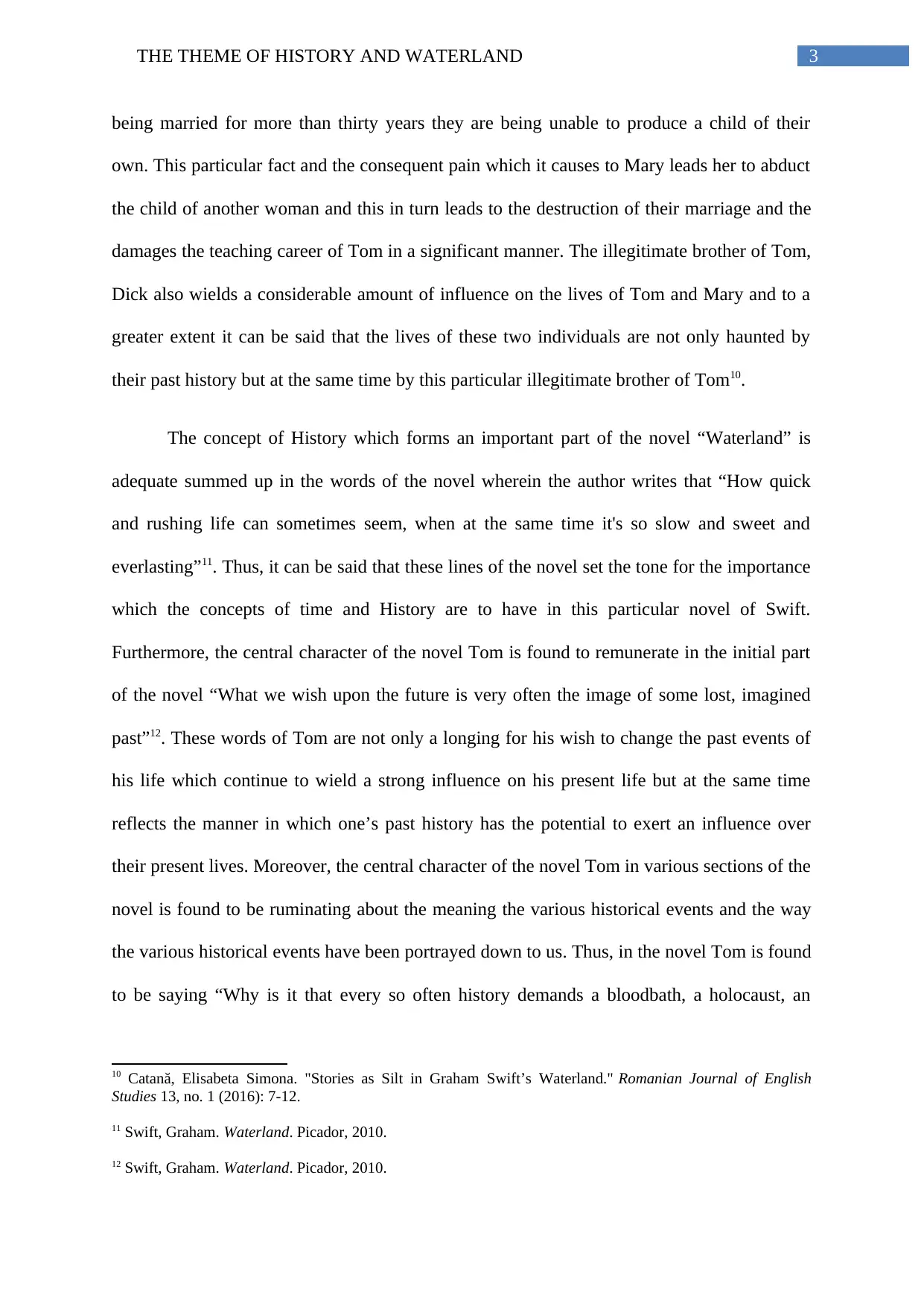
3THE THEME OF HISTORY AND WATERLAND
being married for more than thirty years they are being unable to produce a child of their
own. This particular fact and the consequent pain which it causes to Mary leads her to abduct
the child of another woman and this in turn leads to the destruction of their marriage and the
damages the teaching career of Tom in a significant manner. The illegitimate brother of Tom,
Dick also wields a considerable amount of influence on the lives of Tom and Mary and to a
greater extent it can be said that the lives of these two individuals are not only haunted by
their past history but at the same time by this particular illegitimate brother of Tom10.
The concept of History which forms an important part of the novel “Waterland” is
adequate summed up in the words of the novel wherein the author writes that “How quick
and rushing life can sometimes seem, when at the same time it's so slow and sweet and
everlasting”11. Thus, it can be said that these lines of the novel set the tone for the importance
which the concepts of time and History are to have in this particular novel of Swift.
Furthermore, the central character of the novel Tom is found to remunerate in the initial part
of the novel “What we wish upon the future is very often the image of some lost, imagined
past”12. These words of Tom are not only a longing for his wish to change the past events of
his life which continue to wield a strong influence on his present life but at the same time
reflects the manner in which one’s past history has the potential to exert an influence over
their present lives. Moreover, the central character of the novel Tom in various sections of the
novel is found to be ruminating about the meaning the various historical events and the way
the various historical events have been portrayed down to us. Thus, in the novel Tom is found
to be saying “Why is it that every so often history demands a bloodbath, a holocaust, an
10 Catană, Elisabeta Simona. "Stories as Silt in Graham Swift’s Waterland." Romanian Journal of English
Studies 13, no. 1 (2016): 7-12.
11 Swift, Graham. Waterland. Picador, 2010.
12 Swift, Graham. Waterland. Picador, 2010.
being married for more than thirty years they are being unable to produce a child of their
own. This particular fact and the consequent pain which it causes to Mary leads her to abduct
the child of another woman and this in turn leads to the destruction of their marriage and the
damages the teaching career of Tom in a significant manner. The illegitimate brother of Tom,
Dick also wields a considerable amount of influence on the lives of Tom and Mary and to a
greater extent it can be said that the lives of these two individuals are not only haunted by
their past history but at the same time by this particular illegitimate brother of Tom10.
The concept of History which forms an important part of the novel “Waterland” is
adequate summed up in the words of the novel wherein the author writes that “How quick
and rushing life can sometimes seem, when at the same time it's so slow and sweet and
everlasting”11. Thus, it can be said that these lines of the novel set the tone for the importance
which the concepts of time and History are to have in this particular novel of Swift.
Furthermore, the central character of the novel Tom is found to remunerate in the initial part
of the novel “What we wish upon the future is very often the image of some lost, imagined
past”12. These words of Tom are not only a longing for his wish to change the past events of
his life which continue to wield a strong influence on his present life but at the same time
reflects the manner in which one’s past history has the potential to exert an influence over
their present lives. Moreover, the central character of the novel Tom in various sections of the
novel is found to be ruminating about the meaning the various historical events and the way
the various historical events have been portrayed down to us. Thus, in the novel Tom is found
to be saying “Why is it that every so often history demands a bloodbath, a holocaust, an
10 Catană, Elisabeta Simona. "Stories as Silt in Graham Swift’s Waterland." Romanian Journal of English
Studies 13, no. 1 (2016): 7-12.
11 Swift, Graham. Waterland. Picador, 2010.
12 Swift, Graham. Waterland. Picador, 2010.
Paraphrase This Document
Need a fresh take? Get an instant paraphrase of this document with our AI Paraphraser
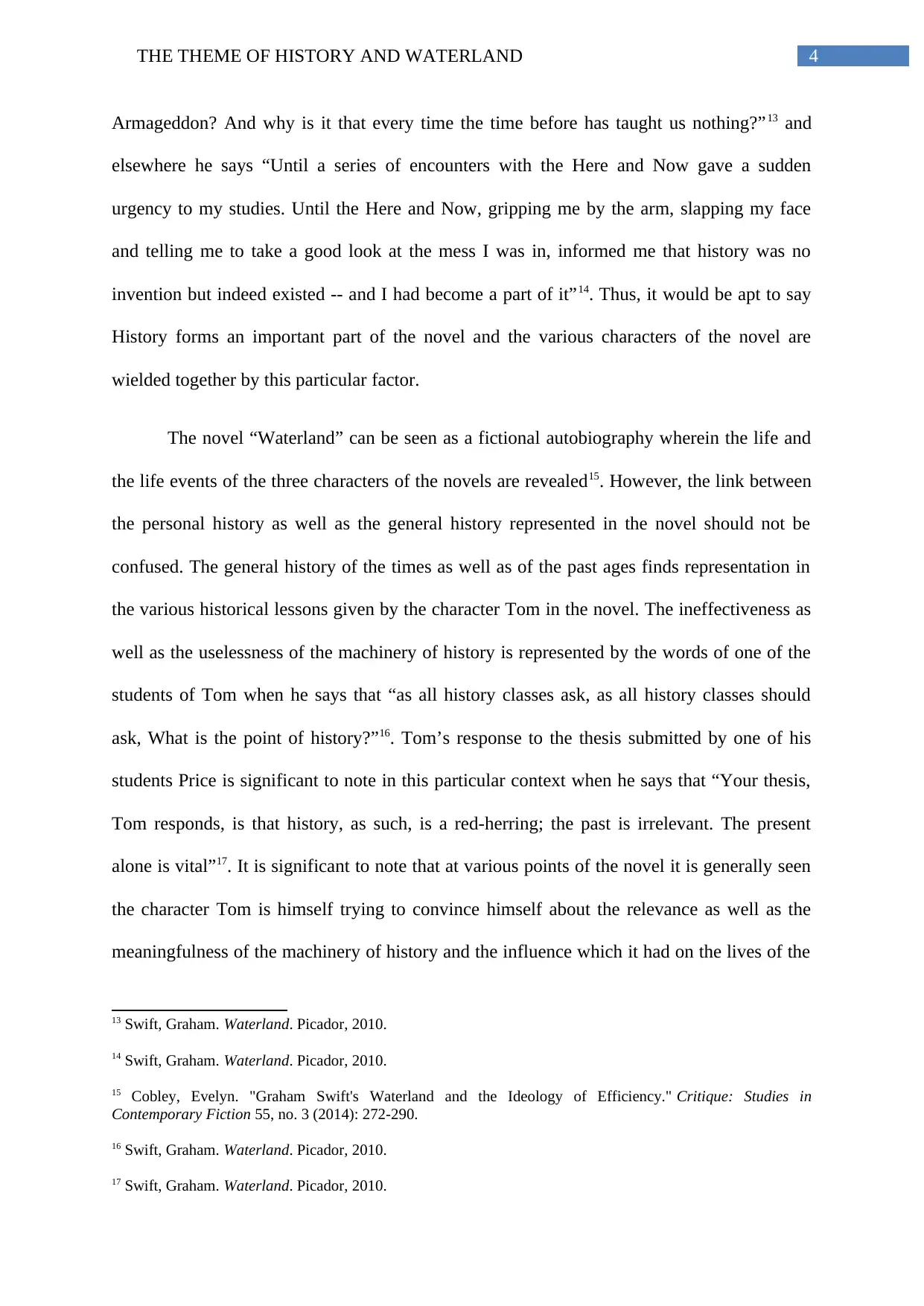
4THE THEME OF HISTORY AND WATERLAND
Armageddon? And why is it that every time the time before has taught us nothing?”13 and
elsewhere he says “Until a series of encounters with the Here and Now gave a sudden
urgency to my studies. Until the Here and Now, gripping me by the arm, slapping my face
and telling me to take a good look at the mess I was in, informed me that history was no
invention but indeed existed -- and I had become a part of it”14. Thus, it would be apt to say
History forms an important part of the novel and the various characters of the novel are
wielded together by this particular factor.
The novel “Waterland” can be seen as a fictional autobiography wherein the life and
the life events of the three characters of the novels are revealed15. However, the link between
the personal history as well as the general history represented in the novel should not be
confused. The general history of the times as well as of the past ages finds representation in
the various historical lessons given by the character Tom in the novel. The ineffectiveness as
well as the uselessness of the machinery of history is represented by the words of one of the
students of Tom when he says that “as all history classes ask, as all history classes should
ask, What is the point of history?”16. Tom’s response to the thesis submitted by one of his
students Price is significant to note in this particular context when he says that “Your thesis,
Tom responds, is that history, as such, is a red-herring; the past is irrelevant. The present
alone is vital”17. It is significant to note that at various points of the novel it is generally seen
the character Tom is himself trying to convince himself about the relevance as well as the
meaningfulness of the machinery of history and the influence which it had on the lives of the
13 Swift, Graham. Waterland. Picador, 2010.
14 Swift, Graham. Waterland. Picador, 2010.
15 Cobley, Evelyn. "Graham Swift's Waterland and the Ideology of Efficiency." Critique: Studies in
Contemporary Fiction 55, no. 3 (2014): 272-290.
16 Swift, Graham. Waterland. Picador, 2010.
17 Swift, Graham. Waterland. Picador, 2010.
Armageddon? And why is it that every time the time before has taught us nothing?”13 and
elsewhere he says “Until a series of encounters with the Here and Now gave a sudden
urgency to my studies. Until the Here and Now, gripping me by the arm, slapping my face
and telling me to take a good look at the mess I was in, informed me that history was no
invention but indeed existed -- and I had become a part of it”14. Thus, it would be apt to say
History forms an important part of the novel and the various characters of the novel are
wielded together by this particular factor.
The novel “Waterland” can be seen as a fictional autobiography wherein the life and
the life events of the three characters of the novels are revealed15. However, the link between
the personal history as well as the general history represented in the novel should not be
confused. The general history of the times as well as of the past ages finds representation in
the various historical lessons given by the character Tom in the novel. The ineffectiveness as
well as the uselessness of the machinery of history is represented by the words of one of the
students of Tom when he says that “as all history classes ask, as all history classes should
ask, What is the point of history?”16. Tom’s response to the thesis submitted by one of his
students Price is significant to note in this particular context when he says that “Your thesis,
Tom responds, is that history, as such, is a red-herring; the past is irrelevant. The present
alone is vital”17. It is significant to note that at various points of the novel it is generally seen
the character Tom is himself trying to convince himself about the relevance as well as the
meaningfulness of the machinery of history and the influence which it had on the lives of the
13 Swift, Graham. Waterland. Picador, 2010.
14 Swift, Graham. Waterland. Picador, 2010.
15 Cobley, Evelyn. "Graham Swift's Waterland and the Ideology of Efficiency." Critique: Studies in
Contemporary Fiction 55, no. 3 (2014): 272-290.
16 Swift, Graham. Waterland. Picador, 2010.
17 Swift, Graham. Waterland. Picador, 2010.
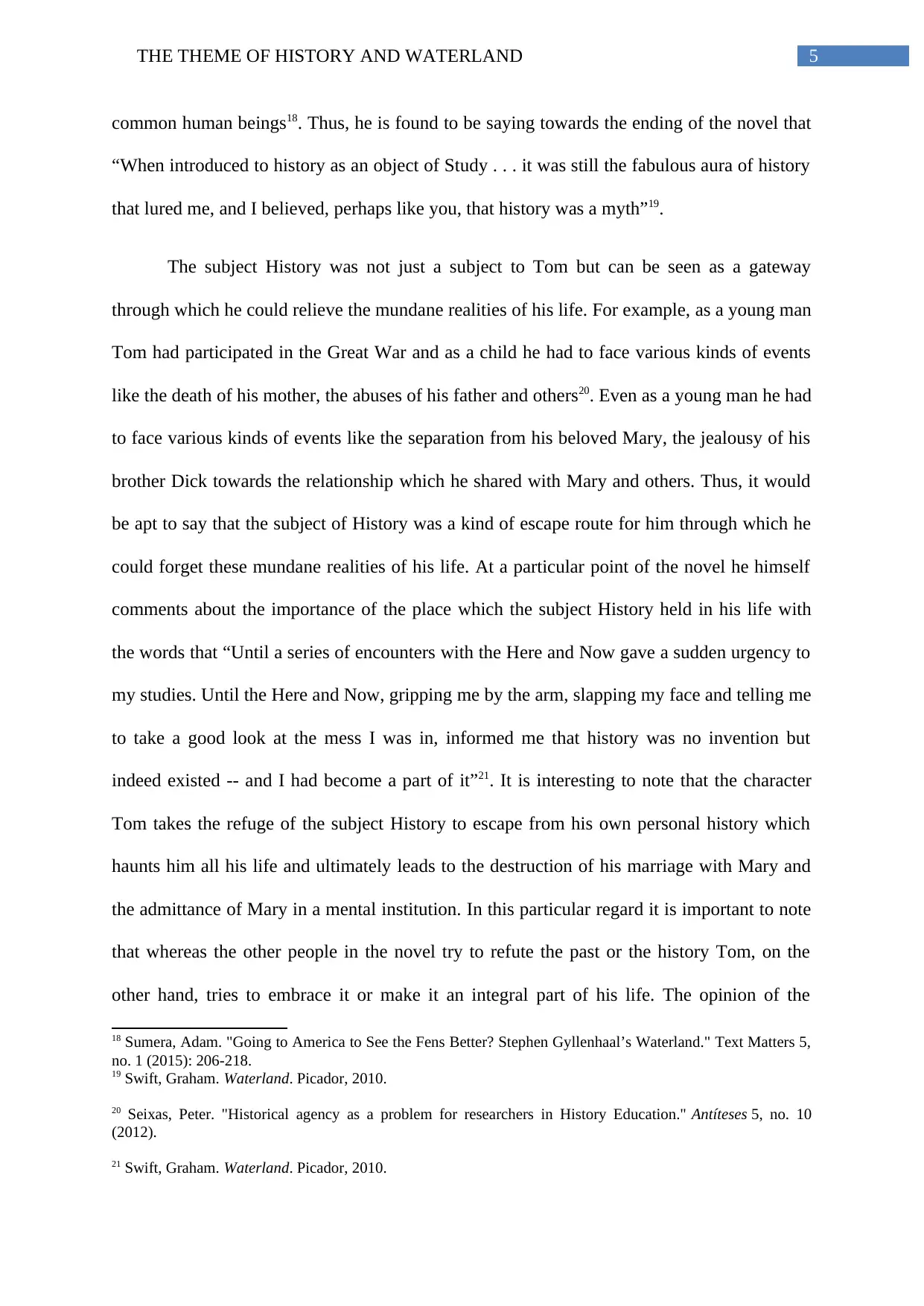
5THE THEME OF HISTORY AND WATERLAND
common human beings18. Thus, he is found to be saying towards the ending of the novel that
“When introduced to history as an object of Study . . . it was still the fabulous aura of history
that lured me, and I believed, perhaps like you, that history was a myth”19.
The subject History was not just a subject to Tom but can be seen as a gateway
through which he could relieve the mundane realities of his life. For example, as a young man
Tom had participated in the Great War and as a child he had to face various kinds of events
like the death of his mother, the abuses of his father and others20. Even as a young man he had
to face various kinds of events like the separation from his beloved Mary, the jealousy of his
brother Dick towards the relationship which he shared with Mary and others. Thus, it would
be apt to say that the subject of History was a kind of escape route for him through which he
could forget these mundane realities of his life. At a particular point of the novel he himself
comments about the importance of the place which the subject History held in his life with
the words that “Until a series of encounters with the Here and Now gave a sudden urgency to
my studies. Until the Here and Now, gripping me by the arm, slapping my face and telling me
to take a good look at the mess I was in, informed me that history was no invention but
indeed existed -- and I had become a part of it”21. It is interesting to note that the character
Tom takes the refuge of the subject History to escape from his own personal history which
haunts him all his life and ultimately leads to the destruction of his marriage with Mary and
the admittance of Mary in a mental institution. In this particular regard it is important to note
that whereas the other people in the novel try to refute the past or the history Tom, on the
other hand, tries to embrace it or make it an integral part of his life. The opinion of the
18 Sumera, Adam. "Going to America to See the Fens Better? Stephen Gyllenhaal’s Waterland." Text Matters 5,
no. 1 (2015): 206-218.
19 Swift, Graham. Waterland. Picador, 2010.
20 Seixas, Peter. "Historical agency as a problem for researchers in History Education." Antíteses 5, no. 10
(2012).
21 Swift, Graham. Waterland. Picador, 2010.
common human beings18. Thus, he is found to be saying towards the ending of the novel that
“When introduced to history as an object of Study . . . it was still the fabulous aura of history
that lured me, and I believed, perhaps like you, that history was a myth”19.
The subject History was not just a subject to Tom but can be seen as a gateway
through which he could relieve the mundane realities of his life. For example, as a young man
Tom had participated in the Great War and as a child he had to face various kinds of events
like the death of his mother, the abuses of his father and others20. Even as a young man he had
to face various kinds of events like the separation from his beloved Mary, the jealousy of his
brother Dick towards the relationship which he shared with Mary and others. Thus, it would
be apt to say that the subject of History was a kind of escape route for him through which he
could forget these mundane realities of his life. At a particular point of the novel he himself
comments about the importance of the place which the subject History held in his life with
the words that “Until a series of encounters with the Here and Now gave a sudden urgency to
my studies. Until the Here and Now, gripping me by the arm, slapping my face and telling me
to take a good look at the mess I was in, informed me that history was no invention but
indeed existed -- and I had become a part of it”21. It is interesting to note that the character
Tom takes the refuge of the subject History to escape from his own personal history which
haunts him all his life and ultimately leads to the destruction of his marriage with Mary and
the admittance of Mary in a mental institution. In this particular regard it is important to note
that whereas the other people in the novel try to refute the past or the history Tom, on the
other hand, tries to embrace it or make it an integral part of his life. The opinion of the
18 Sumera, Adam. "Going to America to See the Fens Better? Stephen Gyllenhaal’s Waterland." Text Matters 5,
no. 1 (2015): 206-218.
19 Swift, Graham. Waterland. Picador, 2010.
20 Seixas, Peter. "Historical agency as a problem for researchers in History Education." Antíteses 5, no. 10
(2012).
21 Swift, Graham. Waterland. Picador, 2010.
⊘ This is a preview!⊘
Do you want full access?
Subscribe today to unlock all pages.

Trusted by 1+ million students worldwide
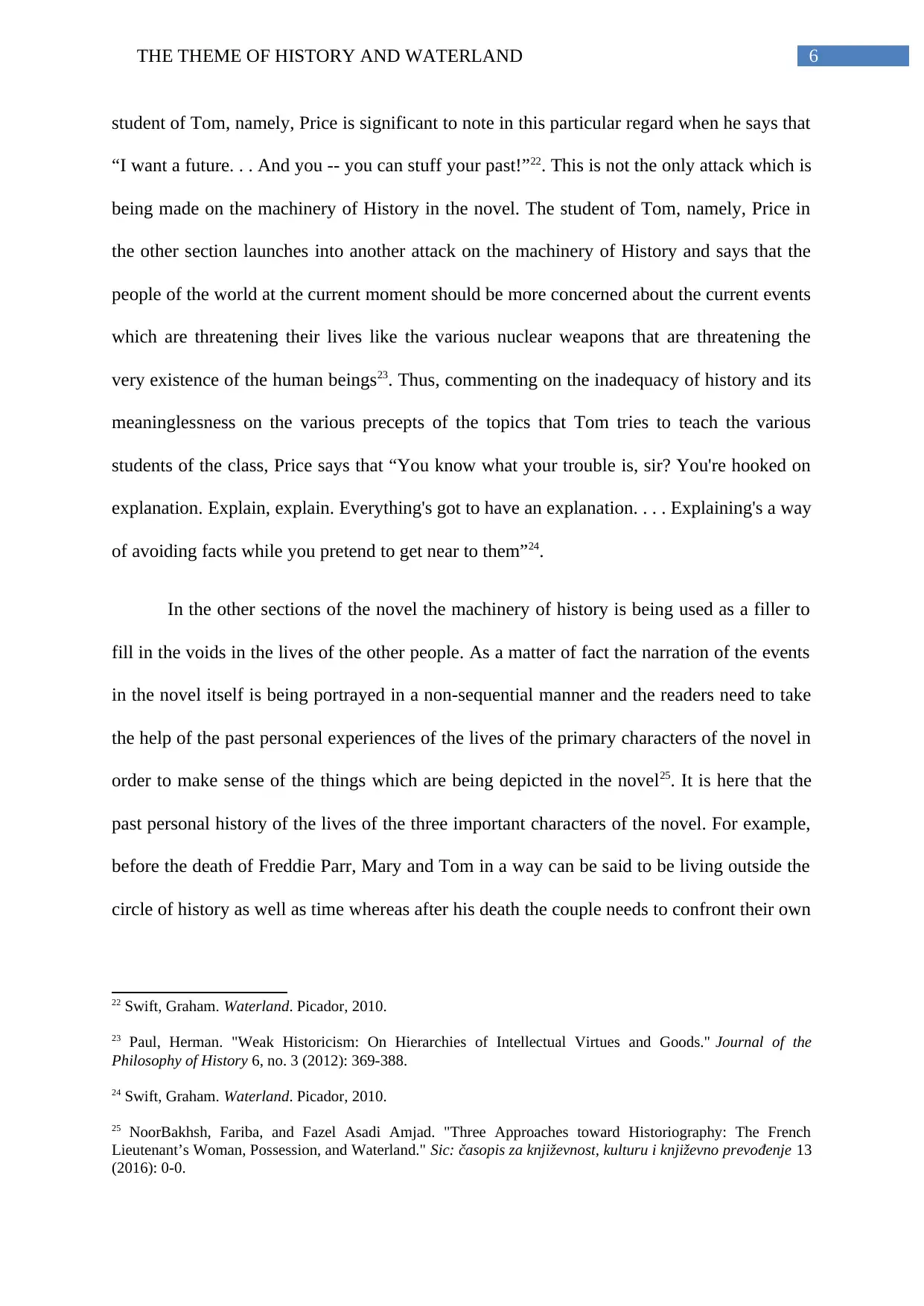
6THE THEME OF HISTORY AND WATERLAND
student of Tom, namely, Price is significant to note in this particular regard when he says that
“I want a future. . . And you -- you can stuff your past!”22. This is not the only attack which is
being made on the machinery of History in the novel. The student of Tom, namely, Price in
the other section launches into another attack on the machinery of History and says that the
people of the world at the current moment should be more concerned about the current events
which are threatening their lives like the various nuclear weapons that are threatening the
very existence of the human beings23. Thus, commenting on the inadequacy of history and its
meaninglessness on the various precepts of the topics that Tom tries to teach the various
students of the class, Price says that “You know what your trouble is, sir? You're hooked on
explanation. Explain, explain. Everything's got to have an explanation. . . . Explaining's a way
of avoiding facts while you pretend to get near to them”24.
In the other sections of the novel the machinery of history is being used as a filler to
fill in the voids in the lives of the other people. As a matter of fact the narration of the events
in the novel itself is being portrayed in a non-sequential manner and the readers need to take
the help of the past personal experiences of the lives of the primary characters of the novel in
order to make sense of the things which are being depicted in the novel25. It is here that the
past personal history of the lives of the three important characters of the novel. For example,
before the death of Freddie Parr, Mary and Tom in a way can be said to be living outside the
circle of history as well as time whereas after his death the couple needs to confront their own
22 Swift, Graham. Waterland. Picador, 2010.
23 Paul, Herman. "Weak Historicism: On Hierarchies of Intellectual Virtues and Goods." Journal of the
Philosophy of History 6, no. 3 (2012): 369-388.
24 Swift, Graham. Waterland. Picador, 2010.
25 NoorBakhsh, Fariba, and Fazel Asadi Amjad. "Three Approaches toward Historiography: The French
Lieutenant’s Woman, Possession, and Waterland." Sic: časopis za književnost, kulturu i književno prevođenje 13
(2016): 0-0.
student of Tom, namely, Price is significant to note in this particular regard when he says that
“I want a future. . . And you -- you can stuff your past!”22. This is not the only attack which is
being made on the machinery of History in the novel. The student of Tom, namely, Price in
the other section launches into another attack on the machinery of History and says that the
people of the world at the current moment should be more concerned about the current events
which are threatening their lives like the various nuclear weapons that are threatening the
very existence of the human beings23. Thus, commenting on the inadequacy of history and its
meaninglessness on the various precepts of the topics that Tom tries to teach the various
students of the class, Price says that “You know what your trouble is, sir? You're hooked on
explanation. Explain, explain. Everything's got to have an explanation. . . . Explaining's a way
of avoiding facts while you pretend to get near to them”24.
In the other sections of the novel the machinery of history is being used as a filler to
fill in the voids in the lives of the other people. As a matter of fact the narration of the events
in the novel itself is being portrayed in a non-sequential manner and the readers need to take
the help of the past personal experiences of the lives of the primary characters of the novel in
order to make sense of the things which are being depicted in the novel25. It is here that the
past personal history of the lives of the three important characters of the novel. For example,
before the death of Freddie Parr, Mary and Tom in a way can be said to be living outside the
circle of history as well as time whereas after his death the couple needs to confront their own
22 Swift, Graham. Waterland. Picador, 2010.
23 Paul, Herman. "Weak Historicism: On Hierarchies of Intellectual Virtues and Goods." Journal of the
Philosophy of History 6, no. 3 (2012): 369-388.
24 Swift, Graham. Waterland. Picador, 2010.
25 NoorBakhsh, Fariba, and Fazel Asadi Amjad. "Three Approaches toward Historiography: The French
Lieutenant’s Woman, Possession, and Waterland." Sic: časopis za književnost, kulturu i književno prevođenje 13
(2016): 0-0.
Paraphrase This Document
Need a fresh take? Get an instant paraphrase of this document with our AI Paraphraser
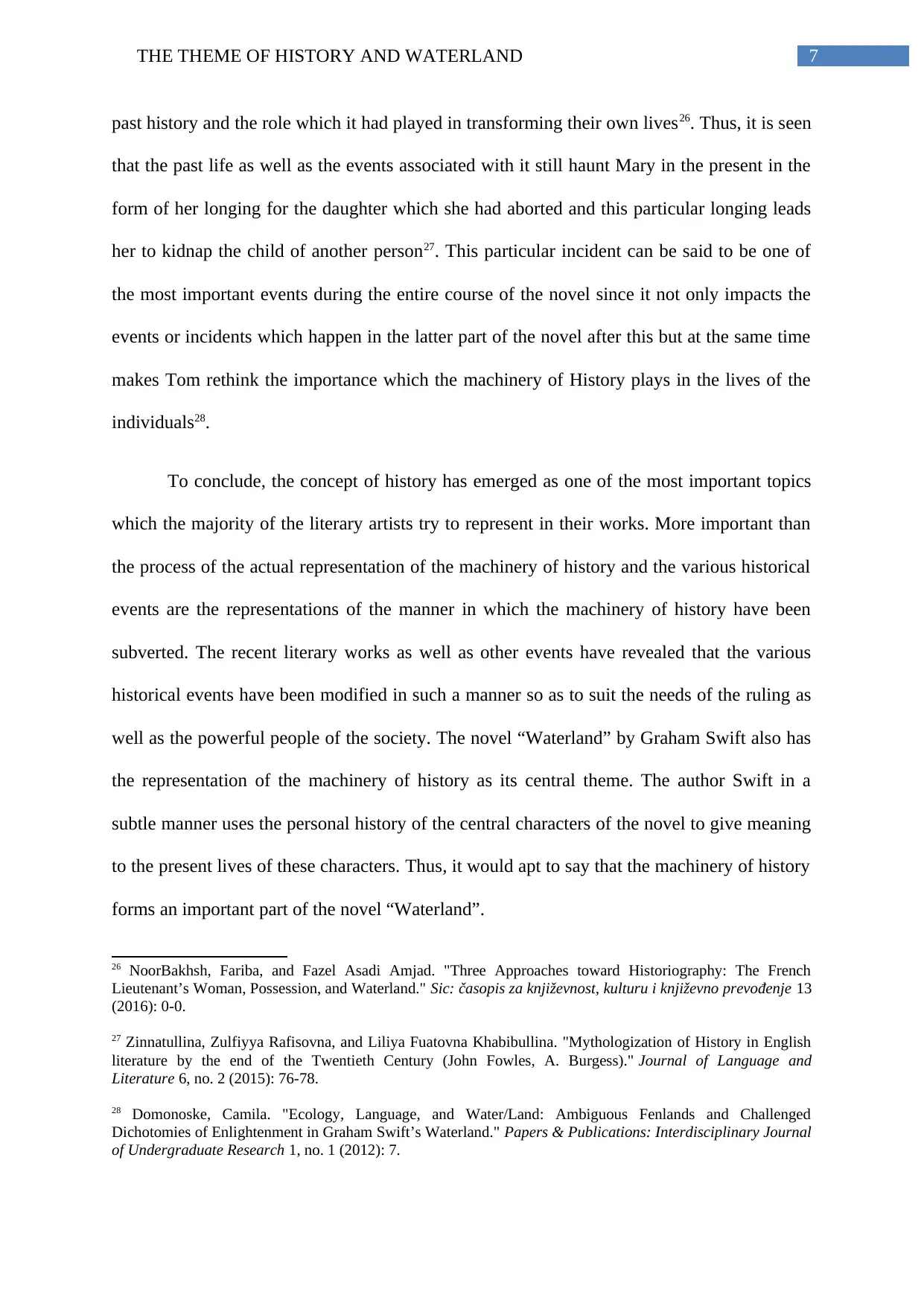
7THE THEME OF HISTORY AND WATERLAND
past history and the role which it had played in transforming their own lives26. Thus, it is seen
that the past life as well as the events associated with it still haunt Mary in the present in the
form of her longing for the daughter which she had aborted and this particular longing leads
her to kidnap the child of another person27. This particular incident can be said to be one of
the most important events during the entire course of the novel since it not only impacts the
events or incidents which happen in the latter part of the novel after this but at the same time
makes Tom rethink the importance which the machinery of History plays in the lives of the
individuals28.
To conclude, the concept of history has emerged as one of the most important topics
which the majority of the literary artists try to represent in their works. More important than
the process of the actual representation of the machinery of history and the various historical
events are the representations of the manner in which the machinery of history have been
subverted. The recent literary works as well as other events have revealed that the various
historical events have been modified in such a manner so as to suit the needs of the ruling as
well as the powerful people of the society. The novel “Waterland” by Graham Swift also has
the representation of the machinery of history as its central theme. The author Swift in a
subtle manner uses the personal history of the central characters of the novel to give meaning
to the present lives of these characters. Thus, it would apt to say that the machinery of history
forms an important part of the novel “Waterland”.
26 NoorBakhsh, Fariba, and Fazel Asadi Amjad. "Three Approaches toward Historiography: The French
Lieutenant’s Woman, Possession, and Waterland." Sic: časopis za književnost, kulturu i književno prevođenje 13
(2016): 0-0.
27 Zinnatullina, Zulfiyya Rafisovna, and Liliya Fuatovna Khabibullina. "Mythologization of History in English
literature by the end of the Twentieth Century (John Fowles, A. Burgess)." Journal of Language and
Literature 6, no. 2 (2015): 76-78.
28 Domonoske, Camila. "Ecology, Language, and Water/Land: Ambiguous Fenlands and Challenged
Dichotomies of Enlightenment in Graham Swift’s Waterland." Papers & Publications: Interdisciplinary Journal
of Undergraduate Research 1, no. 1 (2012): 7.
past history and the role which it had played in transforming their own lives26. Thus, it is seen
that the past life as well as the events associated with it still haunt Mary in the present in the
form of her longing for the daughter which she had aborted and this particular longing leads
her to kidnap the child of another person27. This particular incident can be said to be one of
the most important events during the entire course of the novel since it not only impacts the
events or incidents which happen in the latter part of the novel after this but at the same time
makes Tom rethink the importance which the machinery of History plays in the lives of the
individuals28.
To conclude, the concept of history has emerged as one of the most important topics
which the majority of the literary artists try to represent in their works. More important than
the process of the actual representation of the machinery of history and the various historical
events are the representations of the manner in which the machinery of history have been
subverted. The recent literary works as well as other events have revealed that the various
historical events have been modified in such a manner so as to suit the needs of the ruling as
well as the powerful people of the society. The novel “Waterland” by Graham Swift also has
the representation of the machinery of history as its central theme. The author Swift in a
subtle manner uses the personal history of the central characters of the novel to give meaning
to the present lives of these characters. Thus, it would apt to say that the machinery of history
forms an important part of the novel “Waterland”.
26 NoorBakhsh, Fariba, and Fazel Asadi Amjad. "Three Approaches toward Historiography: The French
Lieutenant’s Woman, Possession, and Waterland." Sic: časopis za književnost, kulturu i književno prevođenje 13
(2016): 0-0.
27 Zinnatullina, Zulfiyya Rafisovna, and Liliya Fuatovna Khabibullina. "Mythologization of History in English
literature by the end of the Twentieth Century (John Fowles, A. Burgess)." Journal of Language and
Literature 6, no. 2 (2015): 76-78.
28 Domonoske, Camila. "Ecology, Language, and Water/Land: Ambiguous Fenlands and Challenged
Dichotomies of Enlightenment in Graham Swift’s Waterland." Papers & Publications: Interdisciplinary Journal
of Undergraduate Research 1, no. 1 (2012): 7.
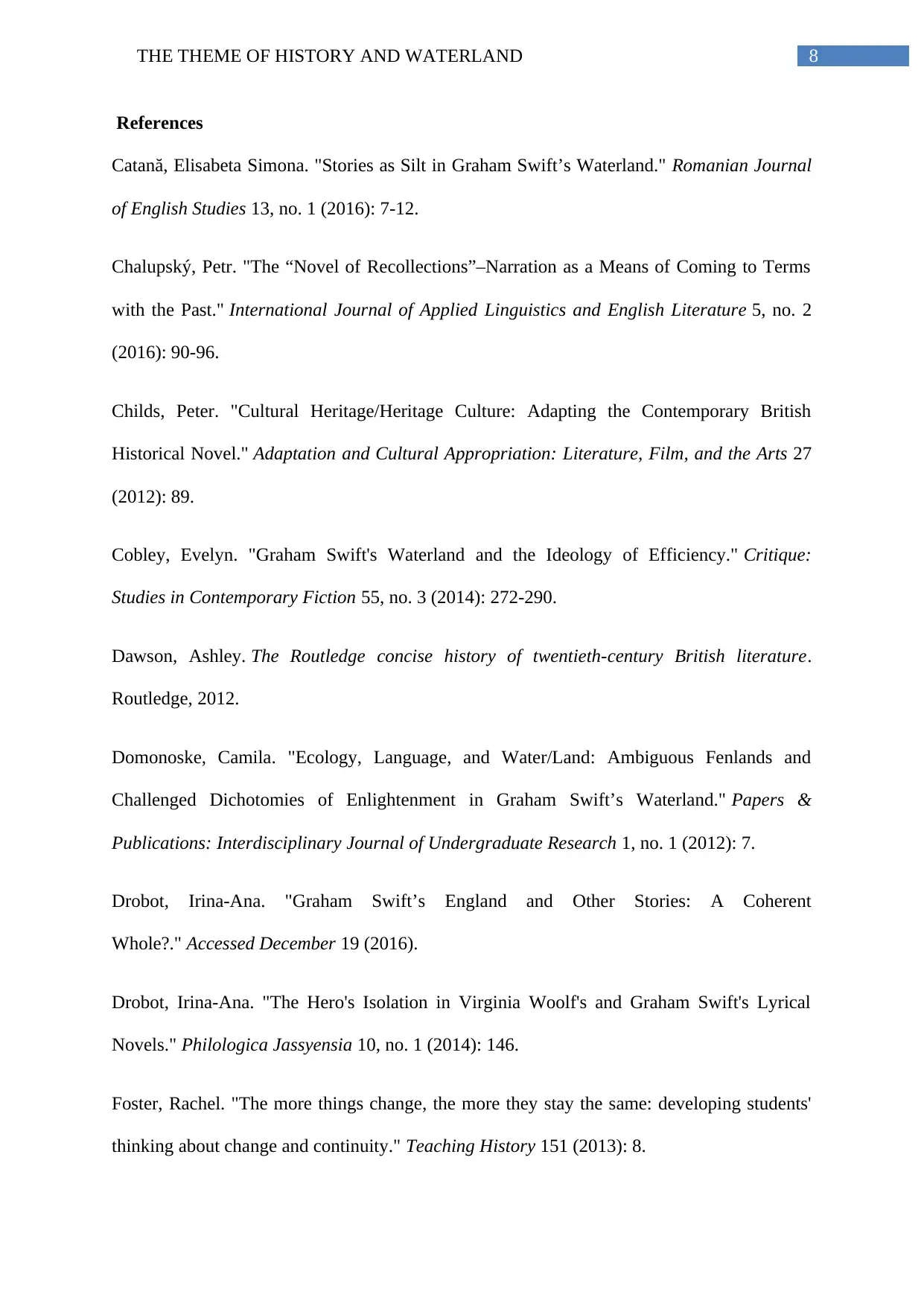
8THE THEME OF HISTORY AND WATERLAND
References
Catană, Elisabeta Simona. "Stories as Silt in Graham Swift’s Waterland." Romanian Journal
of English Studies 13, no. 1 (2016): 7-12.
Chalupský, Petr. "The “Novel of Recollections”–Narration as a Means of Coming to Terms
with the Past." International Journal of Applied Linguistics and English Literature 5, no. 2
(2016): 90-96.
Childs, Peter. "Cultural Heritage/Heritage Culture: Adapting the Contemporary British
Historical Novel." Adaptation and Cultural Appropriation: Literature, Film, and the Arts 27
(2012): 89.
Cobley, Evelyn. "Graham Swift's Waterland and the Ideology of Efficiency." Critique:
Studies in Contemporary Fiction 55, no. 3 (2014): 272-290.
Dawson, Ashley. The Routledge concise history of twentieth-century British literature.
Routledge, 2012.
Domonoske, Camila. "Ecology, Language, and Water/Land: Ambiguous Fenlands and
Challenged Dichotomies of Enlightenment in Graham Swift’s Waterland." Papers &
Publications: Interdisciplinary Journal of Undergraduate Research 1, no. 1 (2012): 7.
Drobot, Irina-Ana. "Graham Swift’s England and Other Stories: A Coherent
Whole?." Accessed December 19 (2016).
Drobot, Irina-Ana. "The Hero's Isolation in Virginia Woolf's and Graham Swift's Lyrical
Novels." Philologica Jassyensia 10, no. 1 (2014): 146.
Foster, Rachel. "The more things change, the more they stay the same: developing students'
thinking about change and continuity." Teaching History 151 (2013): 8.
References
Catană, Elisabeta Simona. "Stories as Silt in Graham Swift’s Waterland." Romanian Journal
of English Studies 13, no. 1 (2016): 7-12.
Chalupský, Petr. "The “Novel of Recollections”–Narration as a Means of Coming to Terms
with the Past." International Journal of Applied Linguistics and English Literature 5, no. 2
(2016): 90-96.
Childs, Peter. "Cultural Heritage/Heritage Culture: Adapting the Contemporary British
Historical Novel." Adaptation and Cultural Appropriation: Literature, Film, and the Arts 27
(2012): 89.
Cobley, Evelyn. "Graham Swift's Waterland and the Ideology of Efficiency." Critique:
Studies in Contemporary Fiction 55, no. 3 (2014): 272-290.
Dawson, Ashley. The Routledge concise history of twentieth-century British literature.
Routledge, 2012.
Domonoske, Camila. "Ecology, Language, and Water/Land: Ambiguous Fenlands and
Challenged Dichotomies of Enlightenment in Graham Swift’s Waterland." Papers &
Publications: Interdisciplinary Journal of Undergraduate Research 1, no. 1 (2012): 7.
Drobot, Irina-Ana. "Graham Swift’s England and Other Stories: A Coherent
Whole?." Accessed December 19 (2016).
Drobot, Irina-Ana. "The Hero's Isolation in Virginia Woolf's and Graham Swift's Lyrical
Novels." Philologica Jassyensia 10, no. 1 (2014): 146.
Foster, Rachel. "The more things change, the more they stay the same: developing students'
thinking about change and continuity." Teaching History 151 (2013): 8.
⊘ This is a preview!⊘
Do you want full access?
Subscribe today to unlock all pages.

Trusted by 1+ million students worldwide
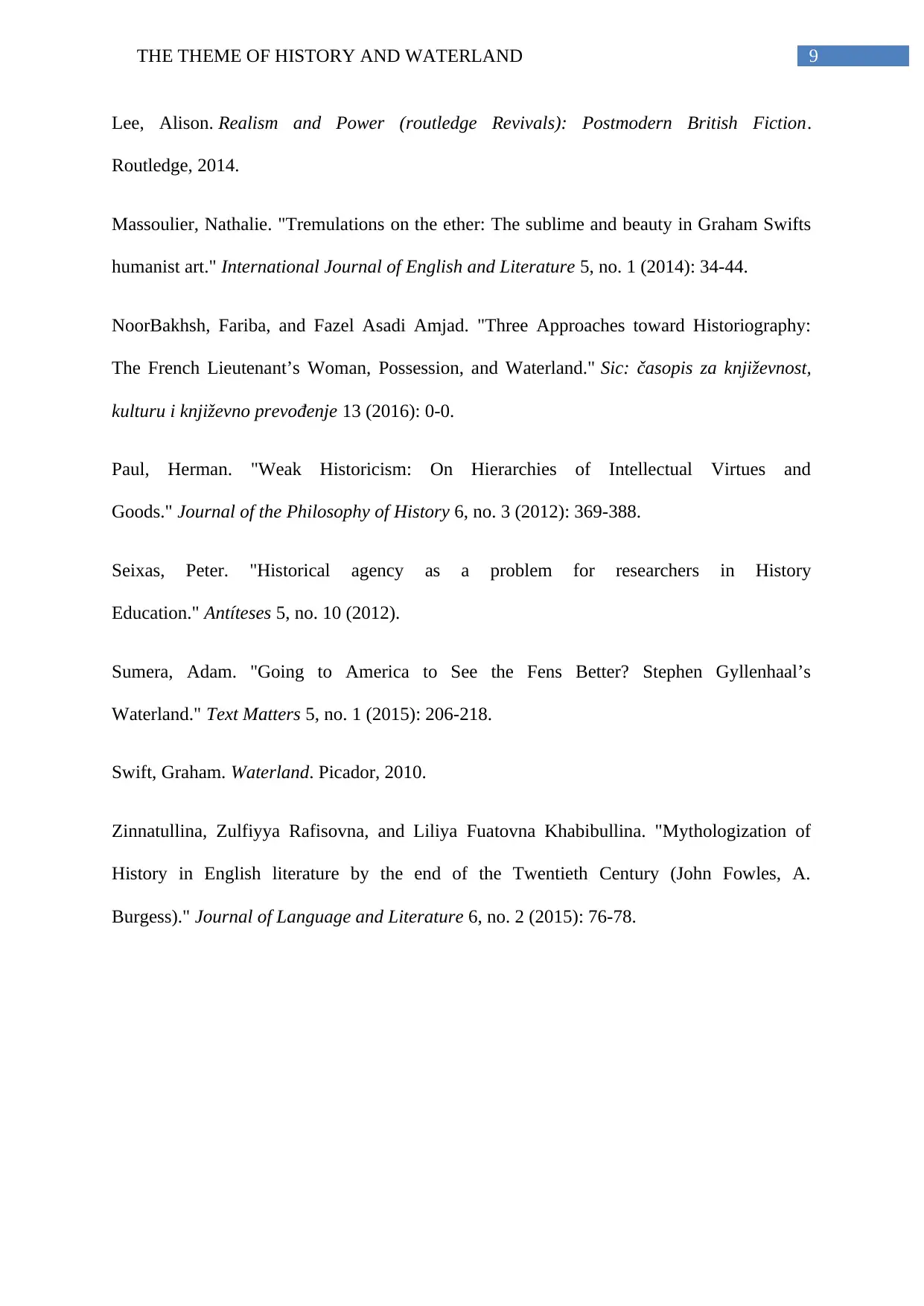
9THE THEME OF HISTORY AND WATERLAND
Lee, Alison. Realism and Power (routledge Revivals): Postmodern British Fiction.
Routledge, 2014.
Massoulier, Nathalie. "Tremulations on the ether: The sublime and beauty in Graham Swifts
humanist art." International Journal of English and Literature 5, no. 1 (2014): 34-44.
NoorBakhsh, Fariba, and Fazel Asadi Amjad. "Three Approaches toward Historiography:
The French Lieutenant’s Woman, Possession, and Waterland." Sic: časopis za književnost,
kulturu i književno prevođenje 13 (2016): 0-0.
Paul, Herman. "Weak Historicism: On Hierarchies of Intellectual Virtues and
Goods." Journal of the Philosophy of History 6, no. 3 (2012): 369-388.
Seixas, Peter. "Historical agency as a problem for researchers in History
Education." Antíteses 5, no. 10 (2012).
Sumera, Adam. "Going to America to See the Fens Better? Stephen Gyllenhaal’s
Waterland." Text Matters 5, no. 1 (2015): 206-218.
Swift, Graham. Waterland. Picador, 2010.
Zinnatullina, Zulfiyya Rafisovna, and Liliya Fuatovna Khabibullina. "Mythologization of
History in English literature by the end of the Twentieth Century (John Fowles, A.
Burgess)." Journal of Language and Literature 6, no. 2 (2015): 76-78.
Lee, Alison. Realism and Power (routledge Revivals): Postmodern British Fiction.
Routledge, 2014.
Massoulier, Nathalie. "Tremulations on the ether: The sublime and beauty in Graham Swifts
humanist art." International Journal of English and Literature 5, no. 1 (2014): 34-44.
NoorBakhsh, Fariba, and Fazel Asadi Amjad. "Three Approaches toward Historiography:
The French Lieutenant’s Woman, Possession, and Waterland." Sic: časopis za književnost,
kulturu i književno prevođenje 13 (2016): 0-0.
Paul, Herman. "Weak Historicism: On Hierarchies of Intellectual Virtues and
Goods." Journal of the Philosophy of History 6, no. 3 (2012): 369-388.
Seixas, Peter. "Historical agency as a problem for researchers in History
Education." Antíteses 5, no. 10 (2012).
Sumera, Adam. "Going to America to See the Fens Better? Stephen Gyllenhaal’s
Waterland." Text Matters 5, no. 1 (2015): 206-218.
Swift, Graham. Waterland. Picador, 2010.
Zinnatullina, Zulfiyya Rafisovna, and Liliya Fuatovna Khabibullina. "Mythologization of
History in English literature by the end of the Twentieth Century (John Fowles, A.
Burgess)." Journal of Language and Literature 6, no. 2 (2015): 76-78.
1 out of 10
Related Documents
Your All-in-One AI-Powered Toolkit for Academic Success.
+13062052269
info@desklib.com
Available 24*7 on WhatsApp / Email
![[object Object]](/_next/static/media/star-bottom.7253800d.svg)
Unlock your academic potential
Copyright © 2020–2026 A2Z Services. All Rights Reserved. Developed and managed by ZUCOL.





